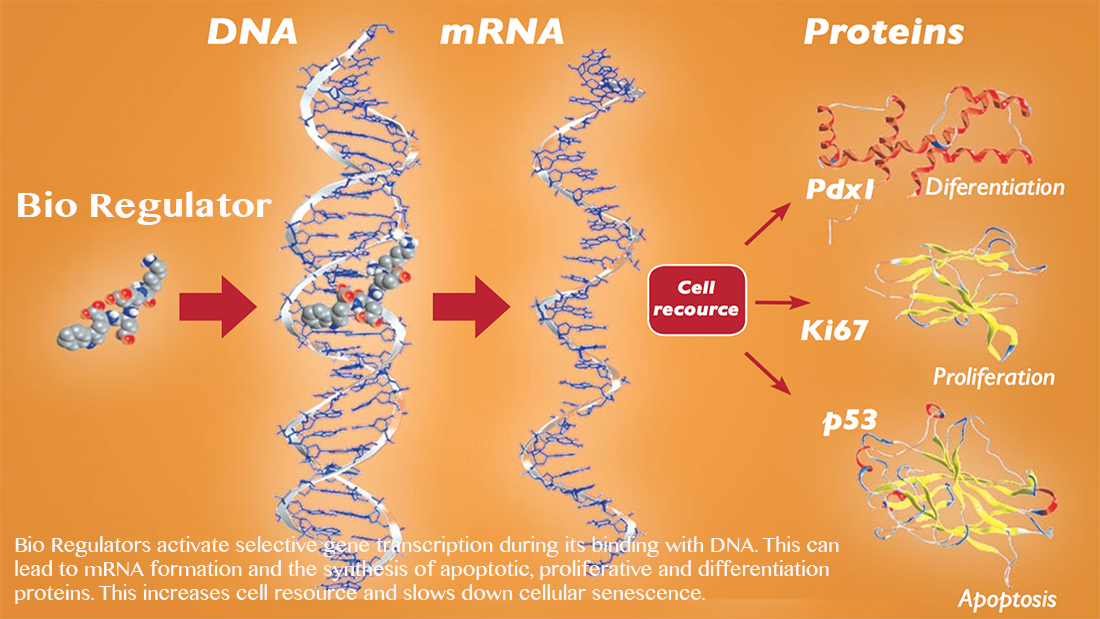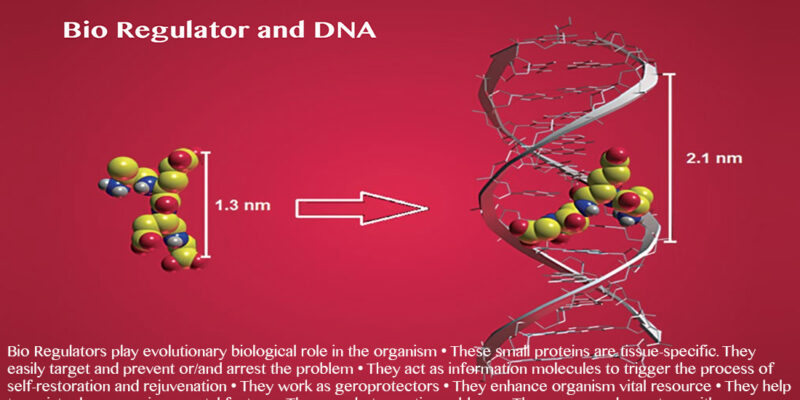
Application of Khavinson peptides
In a randomized comparative study which lasted for 15 years, in elderly people with premature cardiovascular aging, it was found that the administration of the medicinal peptide preparation ‘Epithalamin’ slowed down the rate of aging and decreased mortality. By the end of this period 16 of 40 patients in the control group (40%) and 26 of 39 patients treated with Epithalamin (66.7%) were living. A long-term application of ‘Epithalamin’ (6 courses over a period of 3-years), also slows down the aging of the cardiovascular system, preventing an age-related increase in the physical stamina, normalizing the diurnal rhythm of melatonin synthesis, as well as carbohydrate and lipid metabolism.
Treatment efficiency was evaluated by shifts in the following parameters: CVS functional age, threshold exercise power, total cholesterol, glucose concentration after overnight fasting and 2 hour after standard glucose tolerance test, plasma melatonin concentration. Threshold execise power (in W) was evaluated by bicycle ergometry using common diagnostic criteria. Cardiovascular system FA was evaluated by the method using mathematical formulas based on the threshold exercise power and haemodynamics at the peak of threshold exercise. The degree of CVS aging was calculated as the difference between functional age and actual age. Oral glucose tolerance test with 75 g glucose was carried out as recommended by the WHO. The geroprotective effect of pineal gland peptides is also confirmed by the decreased mortality rate, shown with the Kaplan-Meier survival curves (Fig. 5).
The peptide preparations of the thymus, (‘Thymalin’, peptides EW and KE) was shown to be effective in the treatment of many diseases and conditions associated with decreased cell immunity and phagocytosis after radiotherapy and chemotherapy in cancer patients. It also had an effect in many other clinical setting such as cases of acute and chronic infectious and inflammatory diseases, overuse of antibiotics, oppression of the regeneration processes in post-traumatic and postoperative complications, obliterating diseases of arteries, chronic liver or prostate diseases, and complex treatment of certain forms of tuberculosis. Application of “Thymalin” in different clinical studies improved immune functions significantly (increased amount of T-lymphocytes, T-lymphocytes-helpers, enhanced reaction of lymphocytes blast-transformation in presence of phytoheamagglutinin and Concanavalin A were registered, as well as reinforced reaction of phagocytosis).
Peptide preparation ‘Cortexin’ is an extract from the cerebral cortex wich exerts a significant neuroprotective effect. This preparation improves memory, stimulates reparative processes and accelerates restoration of ceberal functions after stress. This preparation is also effective in the treatment of craniocerebral injury, cerebral circulatory disorders, viral and bacterial neuroinfections, encephalopathy of different genesis, acute and chronic encephalitis and encephalomyelitis. A particularly high efficiency of this peptide preparation was noted in elderly patients.
A remarkable clinical effect has been observed with the peptide ‘Retinalamin’, which is extracted from the retina of animals. This unique preparation is applied in patients with various degenerative diseases of the retina such as; diabetic retinopathy, involutional degeneration, retinitis pigmentosa and other pathologies. Of particular importance is its ability to restore electrical activity of the retina, moreover this restoration usually correlates with an improvement of visual functions (vision acuity, fields of vision, electro-physiological investigation).
Another peptide preparation which is called ‘Prostatilen’ was extracted from animal prostate gland. This preparation is effective for treatment of chronic prostatitis, adenoma and complications after prostate gland surgery, as well as in different age-related prostate dysfunctions.
It should be emphasized that Khavinson peptides selectively bind to specific DNA sites in vitro. They epigenetically regulate expression of genes, (oncogenes, telomerase gene, interleukins genes, transcription factors genes) as well as the synthesis of proteins – markers of differentiation, proliferation, apoptosis and increase the length of telomeres in somatic cells. These peptides furthermore increase the average lifespan, decrease tumour incidence in animals and decrease human mortality by maintaining endocrine, nervous and immune systems.

